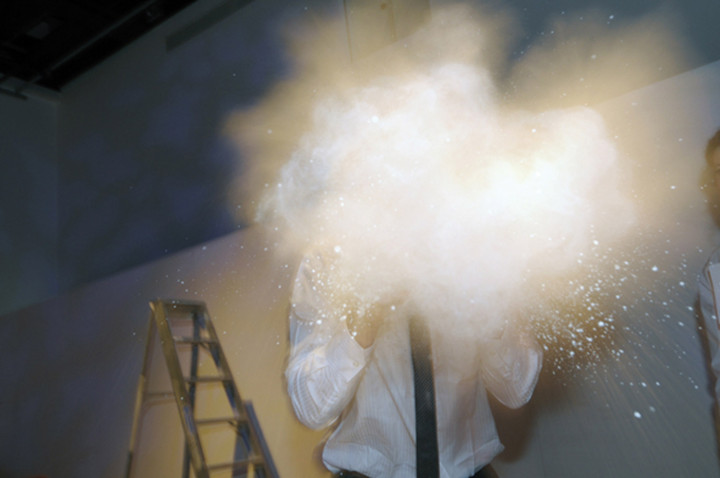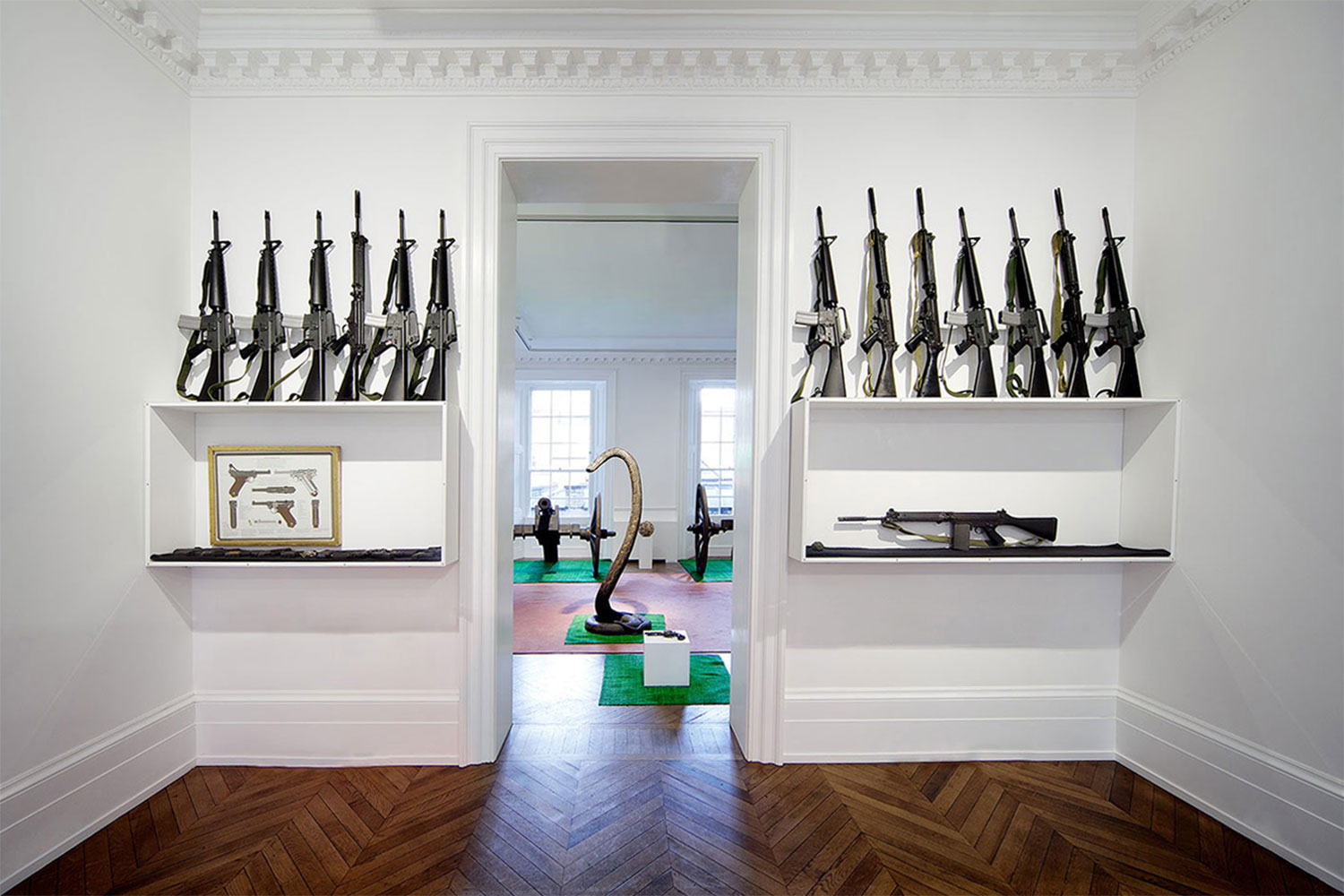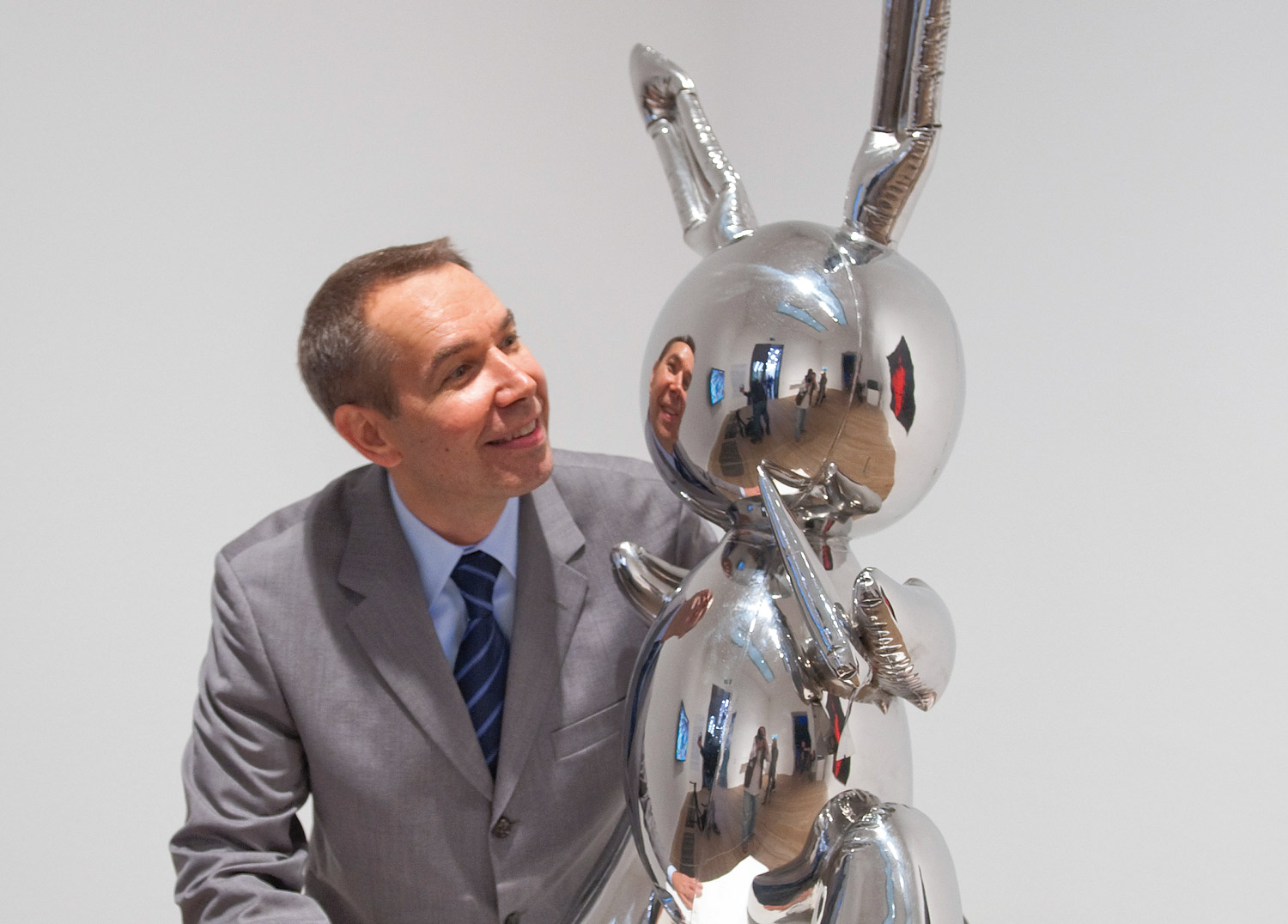
As soon as my dad told me I needed to make money and thus get a job, I found myself in a giant hall of an insurance company in front of four directors facing me. I had to be there every day. After a wonderful youth as a storyteller, illusionist, puppeteer and adventurer, this felt like hell. Then, I made the most important decision of my life. I caught the attention of the directors, threw my typewriter on the floor and was immediately fired. I have never had a job since, and did almost everything without money. I fooled my father that I wanted to make big money in the publicity world, and I needed to go to the art academy.
Although he was very angry he agreed, and soon I was surrounded by art teachers who told me that what really inspired me turned out to be wrong, because it wasn’t art. I left home, lived in a small ruin and began playing and painting the way I liked. I started a pantomime group with some friends on the academy and soon we disliked traditional theater and started to make visual music. Just movements. The academy told us that it wasn’t art. I got in touch with composers of modern music, but soon discovered that they were also very concerned with the judgment of the official art world. No freedom there either. In order to escape that jail, I took the last piece of paper from the easel, crumpled it and declared it as my last piece of art: a paper constellation. I made crumpled-theater, crumpled-music, crumpled-fashion, crumpled-sculptures and crumpled-interiors.
I convinced my friends that the dictatorship of art was over and we started to sabotage art shows in a playful way. One day my father had to pick me up from the police station because we had “disturbed” the opening of a very important exhibition. He brought me to the train station and told me to move to Amsterdam: “that’s where you belong.” Within a year I got all the young Dutch composers together, convincing them that it was high time to stop the art judgment and throw all different media on one big heap, so we could start playing with it. We started the Mood Engineering Society (MES) and organized three “concerts” in which the very first events, performances, visual music, crumpled sounds, etc. were introduced to a shocked audience. The art world and the press were very angry and the young composers (Peter Schat, Misha Mengelberg, Louis Andriessen, Dick Raaymakers, Ton Bruynel, Jaap Spek, Rob Dubois and others) stopped immediately because their career in the official music world was in danger.

I couldn’t be stopped and started with Wim T. Schippers AFSRINMOR (Association For Scientific Research In New Methods Of Recreation) and the SPO (Society for Party Organizing) which set up parties as pure improvised theater with no difference between actors and audience. The SEO (Society for Exhibition Organizing) “improved” artworks, museums and exhibitions. Then, I heard about Nam June Paik and was immediately inspired. I made a deal with the Haagse Post, a weekly magazine, to do an interview with him and went to Germany where he had an exhibition. We talked for hours. When I told my history he looked at me and said: “You are Fluxus!” He did not explain it, just wanted my phone number. Two weeks later George Maciunas phoned me with the words: “You are Fluxus,” and invited me to take part in the very first Flux event in an Amsterdam gallery. There I met Dick Higgins, Alison Knowles, Wolf Vostell, George Maciunas, Benjamin Patterson, Tomas Schmit, Nam June Paik, Emmett Williams and many others for the first time.
Alison did a performance in which she took her panties off, then another one, one after the other. Great! We did performances on the streets and for the first time I saw people using their freedom to go into unknown territories. They loved the paper constellation pieces I did. It felt like coming home. I started Gallery Amstel 47 where Paik and Ben Vautier exhibited. Of course I began to organise Flux concerts all over the country. With George Maciunas, the founder of Fluxus, I had a close contact, and he invited me to Flux concerts all over Europe. Many times I created new Flux works right at the spot. In 1963, Dutch television invited Wim T. Schippers and me to make a program about all the new “art” that was coming up then. It became a totally absurd show in which we introduced Fluxus, Zero, Pop Art, and of course our own works.
We filmed the “March Through Amsterdam” announced by big posters all over the country and performed by six well-dressed gentlemen, walking in twos and followed by journalists and even some police detectives. It was a demonstration for nothing against nothing. A big crumpled ball was driving through the city with the police guiding it. Wim T. Schippers gave a big press conference at the beach to just empty a bottle of lemonade in the sea. The press was furious and thought it was all fake, but the art world became interested, and soon my crumpled paper constellations were hanging in one of the biggest museums. I had become an official artist. After the official opening we had a dinner with the director of Amsterdam’s Stedeijk Museum, Wim Beeren. He asked me what would happen next after all these revolutions. I said that it would be more of the same, all variations on what Fluxus developed and that I decided to step out of art all together. He was shocked. He gave me the chance of my life and I wanted to step out of art? Why? I explained that I was only interested in going into unknown territories, the insecure field of life. Most people are terrified of it. When I brought audiences into that state during my performances, there was panic, but there was always an idiot who said: “It’s ART!” The audience was immediately relieved. Oh… it’s art. Thank God. We were getting scared. The word “art” destroys all life. That’s why I step out of it. Museums are a sort of mausoleum.

George Maciunas liked my stepping out. He visited me and made me the Flux Chairman for Northern Europe. He gave me a complete collection of Flux works and I started the European Mail Order House, because he moved back to New York. Although Wim and I designed a complete Fluxus issue of a Dutch art magazine and I made a catalogue with price list, nothing much was sold. It was not considered art. That’s why I started with Peter J. Muller a national weekly paper (still without any money, I just convinced a printer) in which everybody could publish whatever they wanted. It became a big success. A whole generation grew up with this Flux project, but I never used the words “art” or “Fluxus.” I started with some friends two big clubs (Paradiso & Fantasio) in which everybody could jump on stage and do their own events. I was one of the first deejays directing the unpredictable shows. Within two years there were about 100 of those clubs in the country. The word “art” was never used.
I started a “dance” group that performed flux acts in between all the acts that the visitors brought in and everybody loved them. I was also regularly invited to present my acts in Flux concerts all over the world, and they mostly took place in museums and galleries which created an entirely different atmosphere. Although all the Flux friends felt like family and I still tasted a great freedom from judgment and seriousness, I didn’t like the locations. They loved it when I told them about my radio experiments on national radio. How everybody could send in any sound and I played it. How I told the listeners to step in their car and follow my instructions. Thirty thousand listeners started driving in the middle of the night, having incredible adventures. A great flux adventure that people are still talking about.
My whole life was in a state of Flux. I did everything without money because I discovered that when you are totally inspired (and you can’t fake that) you automatically inspire everybody around you. On a certain moment I lived in a huge villa in Italy, overlooking the Mediterranean (don’t ask me how) and we made a television show there in which I announced I would become an artist again. It was transmitted nationally on New Years Eve. I made illegal exhibitions in MoMA and the Stedelijk Museum of Amsterdam (without permission) where visitors (with headphones on) looked at all my illegal works, like holes in the wall, cracks in the windows, etc. The Village Voice in New York wrote that they judged it the exhibition of the month. The Tate Gallery recently wanted even a legal illegal one, during their “Fluxus Olympiad.” I even started a series of Radio shows called Radio Art, in which the listeners got instructions to perform Fluxworks at home or on the street.

Eric Andersen initiated a Flux dinner in Copenhagen where events were performed at your table. I liked it so much that I organized a Flux dinner in the Hilton Hotel in Amsterdam. Recently I was master of ceremonies at a Flux dinner in the BALTIC Centre for Contemporary Art, in Gateshead, in which people at the tables performed Flux pieces themselves. I wrote a book that tells you how we create the world after our own image; that we’re all artists with incredible power, that we’ll be lost as soon as we start to judge. It’s so popular that the seventh printing is already coming up. I sold my genetic code in Korea to Larry Miller and he made a sales exhibition so that everybody can create a Willem de Ridder now. The list of fluxprojects that I did is endless and it became very clear to me that the young generation is very interested in the way Fluxus liberated us from all those officials who not only decided how we had to live, but what was art and what wasn’t.
We’ve been fooled into believing that people can think about you. The biggest fear in the West is to speak out in the open. We’re terrified to be judged, condemned, laughed at or thrown out. It’s the biggest lie ever. Nobody can see you. All they see is their own image, which is formed by their ideas, beliefs, convictions, etc. That’s why I created magazines with a soundtrack, so every image changed in front of your eyes because of the story you heard. I even made a different soundtrack for Dynasty, the famous soap on national television. So the whole story changed with the same images. Everybody sees something different anyway. You cannot look in their heads to see what they see. There is no so-called objective reality. So if they can’t see you, how can they think about you? Forget it. It’s not important what they think, but what you think, because that’s what you’re ‘seeing.’ If you suffer, because I’m such an idiot, you feel terrible and blame me. You give your power away and make yourself a victim. Victims don’t exist, only volunteers. Yes, you’re a great artist.





